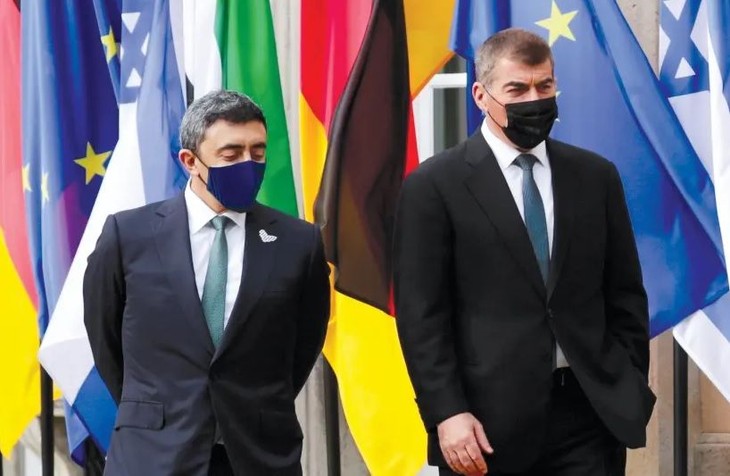(VOVWORLD) -The Middle East, a hotbed of conflict for decades, has recently seen a trend of reconciliation and normalization of relations following the signing of a peace agreement between Israel and the United Arab Emirates ( UAE) on September 15.
 The UAE foreign minister Sheikh Abdullah bin Zayed al-Nahyan (left) and his Israeli counterpart Gabi Ashkenazi meet on October 6 in Berlin. Days later, the UAE officially proposes to open its embassy in the Israeli city of Tel Aviv (Photo: Reuters) The UAE foreign minister Sheikh Abdullah bin Zayed al-Nahyan (left) and his Israeli counterpart Gabi Ashkenazi meet on October 6 in Berlin. Days later, the UAE officially proposes to open its embassy in the Israeli city of Tel Aviv (Photo: Reuters) |
Positive developments
Israel and Bahrain, another Arab country, signed a deal on Thursday that will allow 14 commercial flights a week between Manama airport in Bahrain and Ben Gurion airport in Israel. Israeli Foreign Minister Gabi Ashkenazi said the agreement will trigger a wave of business and tourism growth and Israel will soon open its arms to other countries in the region.
The aviation deal was signed two days after a similar agreement between Israel and the UAE, which also signed three other agreements, including a visa exemption agreement. On Tuesday, the UAE announced it will open an embassy in Tel Aviv "as soon as possible," a strong step toward normalization.
But the most notable has been Sudanese Prime Minister Abdalla Hamdok’s reported readiness to normalize relations with Israel, according to sources inside Sudan’s transitional government. Israeli sources say a delegation headed to Sudan on Thursday to discuss normalization of relations.
Cautious steps
An atmosphere of reconciliation appears to be spreading in the volatile Middle East region, but, experts remain cautious for several reasons.
First, the newly-signed agreements have not received the full support and consensus of the Arab world. Most notably, there has been fierce opposition from Palestine, Iran and Turkey.
Furthermore, US-Iran nuclear tensions and instability in Palestine, Syria, Lebanon, Iraq, and Libya could upset the peaceful embience at any moment.
Meanwhile, the devastating impacts of the COVID-19 pandemic continue to distract international attention away from any potential long-term reconciliation in the Middle East.